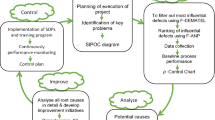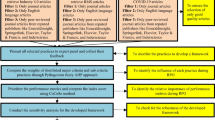Abstract
The formation and effective end-to-end management of manufacturing networks is touted as a top priority for manufacturing enterprises that strive to improve the efficiency, adaptability and sustainability of their production systems. Due to their potential benefits, Dynamic Manufacturing Networks (DMNs), a knowledge-enhanced, model-based production management approach enabling seamless communication and cooperation among individual network members’ manufacturing systems, are gradually becoming a focal point of attention. Nevertheless, current understanding around the DMN concept remains fuzzy, whereas the way in which it can benefit manufacturing enterprises lacks proper articulation. This paper clarifies the management approach of Dynamic Manufacturing Networks on the basis of the DMN lifecycle and the respective information model used, while it further develops a model for their evaluation. In this respect, it employs the soft computing methodology of Fuzzy Cognitive Maps to capture industry laypeople perceptions on the factors that affect their operation, and to reveal insights on prospective benefits. Application of this model in a real-world, multi-site, single factory context in the semi-conductor industry provides good approximations of the experts’ estimations. The results, found in the directions of reduced cycle times, decreased costs and improved quality are quite promising and highlight the key role of the DMN information model. The assessment model designed enables to reason on and identify DMN gains. Thereby, it provides a basis for communication as well as a decision aid that offers evidence on the outcomes of establishing DMNs, ultimately creating a sense of confidence, before an enterprise commits its resources to it.




Similar content being viewed by others
Notes
In particular, the Partner, Product and Quality Assurance components of it.
References
Agostinho C, Ducq Y, Zacharewicz G, Sarraipa J, Lampathaki F, Poler R, Jardim-Goncalves R (2016) Towards a sustainable interoperability in networked enterprise information systems: trends of knowledge and model-driven technology. Comput Ind 79:64–76. https://doi.org/10.1016/j.compind.2015.07.001
Camarinha-Matos LM, Afsarmanesh H (2005) Collaborative networks: a new scientific discipline. J Intell Manuf 16(4):439–452. https://doi.org/10.1007/s10845-005-1656-3
Camarinha-Matos LM, Afsarmanesh H (2007) A comprehensive modeling framework for collaborative networked organizations. J Intell Manuf 18(5):529–542. https://doi.org/10.1007/s10845-007-0063-3
Camarinha-Matos LM, Afsarmanesh H, Galeanoc N, Molinac A (2009) Collaborative networked organizations – Concepts and practice in manufacturing enterprises. Comput Ind Eng 57(1):46–60. https://doi.org/10.1016/j.cie.2008.11.024
Chituc CM, Nof S (2007) The Join/Leave/Remain (JLR) decision in collaborative networked organizations. Comput Ind Eng 53(1):173–195. https://doi.org/10.1016/j.cie.2007.05.002
Chryssolouris G, Papakostas N, Mavrikios D (2008) A perspective on manufacturing strategy: produce more with less. CIRP JMST 1(1):45–52. https://doi.org/10.1016/j.cirpj.2008.06.008
Chytas P, Glykas M, Valiris G (2011) A proactive balanced scorecard. Int J Inform Manag 31(5):460–468. https://doi.org/10.1016/j.ijinfomgt.2010.12.007
Gomes-Casseres B (2003) Competitive advantages in alliance constellations. Strateg Organ 1(3):327–335. https://doi.org/10.1177/14761270030013003
Hammer M, Champy J (1993) Reengineering the corporation: a manifesto for business revolution. Harper Collins, New York
Iakovidis DK, Papageorgiou E (2011) Intuitionistic fuzzy cognitive maps for medical decision making. IEEE T Inf Technol B 15(1):100–107. https://doi.org/10.1109/TITB.2010.2093603
ISA (2010) ANSI/ISA-95.00.01-2010 (IEC 62264-1 Mod) Enterprise-Control System Integration - Part 1: Models and Terminology. https://www.isa.org/store/products/product-detail/?productId=116636
ISA (2013) ANSI/ISA-95.00.03-2013 Enterprise-Control System Integration - Part 3: Activity Models of Manufacturing Operations Management. https://www.isa.org/store/products/product-detail/?productId=116782
Jardim-Goncalves R, Sarraipa J, Agostinho C, Panetto H (2011) Knowledge framework for intelligent manufacturing systems. J Intell Manuf 22(5):725–735. https://doi.org/10.1007/s10845-009-0332-4
Jardim-Goncalves R, Grilo A, Popplewell K (2016) Novel strategies for global manufacturing systems interoperability. J Intell Manuf 27(1):1–9. https://doi.org/10.1007/s10845-014-0948-x
Kaplan RS, Norton D (1992) The balanced scorecard: measures that drive performance. Harvard Bus Rev 70(1):71–79
Koren Y (2010) Business models for global manufacturing enterprises. In: Koren Y (ed) The global manufacturing revolution: product-process-business integration and reconfigurable systems. Wiley, Hoboken, pp 281–314
Kosko B (1986) Fuzzy cognitive maps. Int J Man Mach Stud 24(1):65–75. https://doi.org/10.1016/S0020-7373(86)80040-2
Kosko B (1992) Neural networks and fuzzy systems: a dynamical systems approach to machine intelligence. Prentice Hall, Englewood Cliffs
Laureano-Cruces AL, Ramírez-Rodríguez J, Terán-Gilmore A (2004) Evaluation of the teaching-learning process with fuzzy cognitive maps. In: Lemaître C, Reyes CA, González JA (eds) Advances in artificial intelligence—IBERAMIA 2004. Lecture notes in computer science, vol 3315. Springer, Berlin, pp 922–931. https://doi.org/10.1007/978-3-540-30498-2_92
MESA International. Business to Manufacturing Markup Language (B2MML). http://www.mesa.org/en/B2MacmML.asp
Morris H (2002) Balanced Scorecard Report: insight. Experience and Ideas for Strategy-focused Organisations, Harvard Business School Publishing 4(1):1–17
Nikas A, Doukas H (2016) Developing robust climate policies: a fuzzy cognitive map approach. In: Doumpos M, Zopounidis C, Grigoroudis E (eds) Robustness analysis in decision aiding, optimization, and analytics. International series in operations research and management science, vol 241. Springer, Cham. https://doi.org/10.1007/978-3-319-33121-8_11
Nikas A, Ntanos E, Doukas H (2019) A semi-quantitative modelling application for assessing energy efficiency strategies. Appl Soft Comput 76:140–155. https://doi.org/10.1016/j.asoc.2018.12.015
Open Applications Group Open Applications Group Integration Specification. http://www.oagi.org/oagis/9.0/
O’Sullivan D, Rolstadås A, Filos E (2011) Global education in manufacturing strategy. J Intell Manuf 22(5):663–674. https://doi.org/10.1007/s10845-009-0326-2
Papageorgiou EI, Salmeron JL (2014) Methods and Algorithms for Fuzzy Cognitive Map-based Modeling. In: Papageorgiou EI (ed) Fuzzy cognitive maps for applied sciences and engineering. Intelligent systems reference library. Springer, Berlin, pp 1–28
Papageorgiou E, Stylios CD (2008) Fuzzy cognitive maps. In: Pedrycz W, Skowron A, Kreinovich V (eds) Handbook of granular computing. Wiley, Chichester, pp 755–774
Papageorgiou EI, Spyridonos P, Ravazoula P, Stylios CD, Groumpos PP, Nikiforidis G (2006) Advanced soft computing diagnosis method for tumor grading. Artif Intell Med 36(1):59–70. https://doi.org/10.1016/j.artmed.2005.04.001
Papakostas N, Efthymiou K, Georgoulias K, Chryssolouris G (2012) On the configuration and planning of dynamic manufacturing networks. Logist Res 5(3):105–111. https://doi.org/10.1007/s12159-012-0086-9
Poluha RG (2007) Application of the SCOR model in supply chain management. Cambria Press, Youngstown
Saint Germain B, Valckenaers P, Van Belle J, Verstraete P, Van Brissel H (2012) Incorporating trust in networked production systems. J Intell Manuf 23(6):2635–2646. https://doi.org/10.1007/s10845-011-0597-2
Seifert RW, Langenberg KU (2011) Managing business dynamics with adaptive supply chain portfolios. Eur J Oper Res 215(3):551–562. https://doi.org/10.1016/j.ejor.2011.06.026
Stark J (2011) Product lifecycle management: 21st century paradigm for product realisation. Springer, Berlin
STEP Tools Inc. The STEP Standard - ISO 10303. http://www.steptools.com/library/standard/
Stylios CD, Groumpos PP (2004) Modelling complex systems using fuzzy cognitive maps. IEEE T Syst Man Cy A 34(1):155–162. https://doi.org/10.1109/TSMCA.2003.818878
Supply Chain Council (2010) Supply Chain Operations Reference (SCOR) Model Overview. Version 10.0, Supply Chain Council, United States
Tao F, Cheng Y, Zhang L, Nee AYC (2017) Advanced manufacturing systems: socialization characteristics and trends. J Intell Manuf 28(5):1079–1094. https://doi.org/10.1007/s10845-015-1042-8
Taticchi P, Cagnazzo L, Beach R, Barber K (2012) A management framework for organisational networks: a case study. J Manuf Technol Manag 23(5):593–614. https://doi.org/10.1108/17410381211234426
Tsadiras AK (2008) Comparing the inference capabilities of binary, trivalent and sigmoid fuzzy cognitive maps. Inform Sci 178(20):3880–3894. https://doi.org/10.1016/j.ins.2008.05.015
Viswanadham N, Gaonkar RS (2003) Partner selection and synchronized planning in dynamic manufacturing networks. IEEE Trans Robot Autom 19(1):117–130. https://doi.org/10.1109/TRA.2002.805659
Westphal I, Thoben KD, Seifert MJ (2010) Managing collaboration performance to govern virtual organizations. J Intell Manuf 21(3):311–320. https://doi.org/10.1007/s10845-008-0182-5
Acknowledgements
The research leading to these results has been supported by the EC 7th Framework Programme under the project “IMAGINE—Innovative end-to-end management of Dynamic Manufacturing Networks” Grant Agreement Νο. 285132.
Author information
Authors and Affiliations
Corresponding author
Additional information
Publisher's Note
Springer Nature remains neutral with regard to jurisdictional claims in published maps and institutional affiliations.
Rights and permissions
About this article
Cite this article
Markaki, O., Askounis, D. Assessing the operational and economic efficiency benefits of dynamic manufacturing networks through fuzzy cognitive maps: a case study. Oper Res Int J 21, 925–950 (2021). https://doi.org/10.1007/s12351-019-00488-y
Received:
Revised:
Accepted:
Published:
Issue Date:
DOI: https://doi.org/10.1007/s12351-019-00488-y




